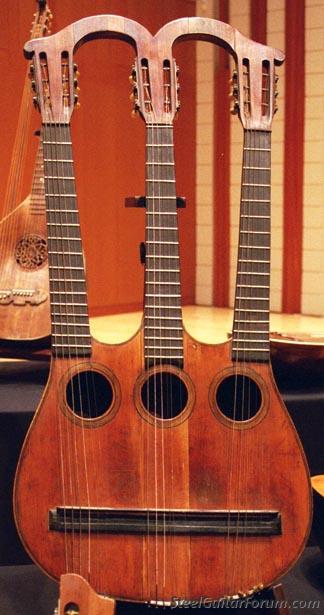
Harp-lyre-guitar thing
Moderator: Brad Bechtel
-
Gary C. Dygert
- Posts: 603
- Joined: 2 May 2002 12:01 am
- Location: Frankfort, NY, USA
Harp-lyre-guitar thing
Imagine this as an acoustic steel guitar. Mr. Brookes, I can hear your mental wheels turning clear across the US!


-
Alan Brookes

- Posts: 13227
- Joined: 29 Mar 2006 1:01 am
- Location: Brummy living in Southern California
Yes, very interesting. It's like the parlour lyre guitars of the 1700s and 1800s, but with three necks. What you can't tell from this angle is how high the nut is. If the nut is regular height and the frets are normal it would have been intended to be played as a normal guitar. But then, why would anyone want three different tunings on a regular guitar on the same instrument ?
Do you have access to this guitar, or did you get the photo somewhere ? I should love to see more shots from different angles.
Do you have access to this guitar, or did you get the photo somewhere ? I should love to see more shots from different angles.
-
Gary C. Dygert
- Posts: 603
- Joined: 2 May 2002 12:01 am
- Location: Frankfort, NY, USA
Try these websites: http://www.harpguitarmusic.com/index.htm
and
www.harpguitars.net. I don't have access to the instrument. It and its weird cousins are very interesting.
and
www.harpguitars.net. I don't have access to the instrument. It and its weird cousins are very interesting.
-
Alan Brookes

- Posts: 13227
- Joined: 29 Mar 2006 1:01 am
- Location: Brummy living in Southern California
Thanks for the links, Gary. The first was interesting. The second didn't work for some reason.
This guitar isn't really a harp guitar, as you know. I remember being serenaded in an Austrian restaurant by a fiddler, accompanied by a harp guitar. I've never understood the purpose of them. The theorbo was a large lute with additional bass strings, and it was used to play the basso continuo in Early Music. Maybe that's where the idea came from originally. There's plenty enough bass on the 5th and 6th strings of a regular guitar for additional bass strings which are not fingered to be not only unnecessary, but in the way.
Returning to the instrument in question, I still wonder the purpose of the three sets of strings. Was it to be played as a regular guitar, but with three separate tunings ? That would be most unusual. I do keep at least one nylon-strung 12-string guitar permanenty tuned in lute/cittern tuning, so that I can practise lute pieces without going to the bother of spending all day tuning the lute's gut strings. Maybe that was the purpose.
This guitar isn't really a harp guitar, as you know. I remember being serenaded in an Austrian restaurant by a fiddler, accompanied by a harp guitar. I've never understood the purpose of them. The theorbo was a large lute with additional bass strings, and it was used to play the basso continuo in Early Music. Maybe that's where the idea came from originally. There's plenty enough bass on the 5th and 6th strings of a regular guitar for additional bass strings which are not fingered to be not only unnecessary, but in the way.
Returning to the instrument in question, I still wonder the purpose of the three sets of strings. Was it to be played as a regular guitar, but with three separate tunings ? That would be most unusual. I do keep at least one nylon-strung 12-string guitar permanenty tuned in lute/cittern tuning, so that I can practise lute pieces without going to the bother of spending all day tuning the lute's gut strings. Maybe that was the purpose.
-
Darrell Urbien

- Posts: 315
- Joined: 20 Oct 2006 12:01 am
- Location: Echo Park, California
-
John Bushouse
- Posts: 704
- Joined: 6 Dec 2003 1:01 am
The address has an extra period at the end. Go to
www.harpguitars.net
The absolutely most authoritative spot on the internet regarding harp guitars.
www.harpguitars.net
The absolutely most authoritative spot on the internet regarding harp guitars.
-
Alan Brookes

- Posts: 13227
- Joined: 29 Mar 2006 1:01 am
- Location: Brummy living in Southern California
This explains it all.Darrell Urbien wrote:Harpolyre History